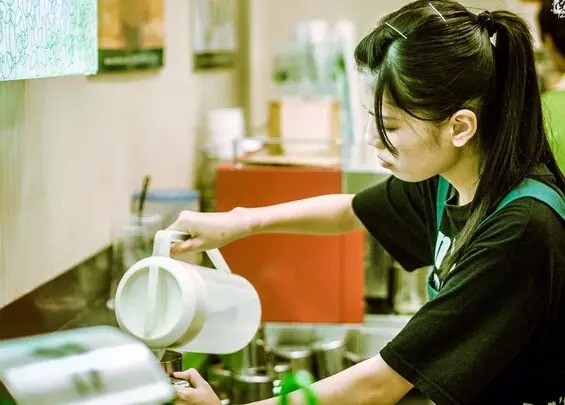VOA reports on coffee in China The status of coffee practitioners in China
Words before translation:
I also remember what Chris, one of the bosses of first Coffee, said yesterday: "the reason why Chinese coffee practitioners have low average status, low salary and low quality is caused by misconceptions in their own country." How can the salary of a barista be high if the cafe is not profitable? It's not like a cafe in Australia selling thousands of cups a day! Of course the baristas there make a lot of money. "his words are still ringing in my ears and reprimanding them over and over again. Yes, the very small population of coffee in China, coupled with Chinese people's disdain and disrespect for the service industry, has led to a very low threshold for coffee practitioners to enter the industry. The so-called "higher education talents" and even their parents look down on the barista industry. It is all the more necessary for the pioneers who really love coffee culture to unite and concentrate their efforts on promoting its development in China. Only when coffee culture is deeply rooted in the hearts of the people will the social status of coffee practitioners in China be improved, contribute to the promotion of the real democratic process in China, and the quality of the people will be improved, and finally mutual respect, politeness and equality between people will be achieved.
The Voice of America reported on the development of coffee in China four months ago.
After reading this article, Berry really wants to go to Xishuangbanna to see what Nestl é has done there!
(the following is a screenshot of the article)
VOA web page
Topic: China catches up with coffee tide
Date: 9 December 2014
Contributor: William Ed
China has been the country of tea culture for a long time. However, more and more Chinese people gradually shift their interest in cooking from tea culture to coffee culture, which is more obvious in the mountainous areas of southern Yunnan and first-tier cities.
In some big cities in China, take Beijing as an example, coffee shops appear on the streets. Starbucks is no longer a monopoly. On the contrary, some coffee shop chains in South Korea, Britain, Taiwan and Hong Kong are on the streets.
Have the potential of one cup per capita.
According to the statistics of the Beijing Coffee Association, the per capita coffee intake in China is five cups a year, a far cry from the 240 cups consumed worldwide. However, the head of the association pointed out that the domestic per capita intake is increasing at an annual rate of 15%.
On any given day, business like GROOVE CAFE, a Korean chain, is DUANG DUANG. People who go to places like that eat beer, fried chicken and ostentatious business. How can anyone really drink coffee? Is VOA stupid? )
Once upon a time, there was a girl named Liu Ming, (why not Xiaoming? (she works for a computer company. She says she averages one cup of coffee a day. She also forces her to drink one cup every morning and one cup in the afternoon if she is sick.
With the Chinese people's love of Java coffee (why Java), merchants see the hope of China's raw bean industry, even though most of the coffee in the Chinese market is imported.
A man surnamed Xue said: Chinese people still like to drink more convenient coffee (this obviously refers to instant coffee). We seldom drink coffee beans grown in our own country, and the coffee we drink is of international brands. (, Nestle and Maxwell)
Coffee is in the tea village
Most Chinese coffee is grown in southern Yunnan. A century ago, a French missionary brought coffee seeds there and cultivated them to survive. It was only a century ago that China began to pay attention to Yunnan coffee.
Dad Xing started to enter Chinese mainland in the 1990s, but only a few years ago he set up a coffee farm in Yunnan. Starbucks not only saw the dawn of Yunnan coffee development, but also saw the continuous increase of coffee production in Yunnan. Berry has always believed that quality and quantity are always inversely proportional, and what human beings call quality and quantity is always the idea of perfectionism. Starbucks' opening of a farm in Yunnan may improve the output of the domestic coffee industry, but whether it can improve the overall quality is still unknown. )
Father Xing's CEO has claimed in several domestic media that China may already be the largest Starbucks coffee market after the United States.
A large part of the coffee is grown in Yunnan, the hometown of black tea in China, Yunnan Pu'er. Swiss food giant Nestl é has been working with Pu'er coffee farmers for nearly 20 years. Nestl é is now working to improve the production and quality of Arabica raw beans. In Pu'er, Nestl é has a purchasing station and a coffee center, which is managed by Walter Dismet. He said: "Pu'er farmers only know tea, for them, coffee is simply a new crop." Knowledge such as how to farm and how to raise seedlings all need to be popularized. The most important thing is to teach them how to grow coffee! " I spurted blood, I hope it is true, but Nestl é will not pay special attention to the quality of Arabica, because no matter how good coffee beans are grown, they have to make instant coffee, and local farmers only want to make a quick profit. How can you be aware to learn in order to improve the quality of coffee beans? )
International standard
To do this, Deiss and he worked with teams of more than 2600 coffee farms around Pu'er and Xishuangbanna. In the past few years, they have successfully helped all people to be validated in international standards called 4C standards or general codes for coffee communities. The 4C standard focuses on the complete coffee supply chain, starting with the metal content index of the soil, and includes restrictions on the use of water, including the coffee growing environment. 4C also includes the prohibition of child labour and the use of low-toxic pesticides by farmers. Yunnan coffee also has some buyers in some domestic cities, but Nestl é hopes they will be the preferred partner for Yunnan coffee farmers. The 4C program also includes training and technical support for farmers, discounts on pesticides, incentive programs, and free soil analysis. It seems that Nestl é has lost a lot of coffee farmers in Yunnan in recent years, and the harvest will naturally decline! Now many domestic boutique coffee merchants realize that Yunnan coffee beans are actually very good varieties, belonging to the Katim species. Although it has a Luodou pedigree of 1 big 4, it is also an ancient variety under Arabica. If Nestl é really has 4C standards and is willing to educate coffee farmers in Yunnan, the take-off of China's coffee industry is just around the corner! But again, capitalists are the exploiting class, and they cannot give more if they do not get the surplus value, so the development of the domestic coffee industry still needs the Chinese themselves. Berries really want to go to Yunnan! )
It's not just coffee.
As one of the poorest provinces in China, growing coffee has proved to be a good cash crop in Yunnan. Unlike other crops, pricing in the international market is more transparent, and coffee farmers have access to equal information. At the peak of the coffee season, farmers sell their coffee according to market fluctuations and personalized needs. In Yunnan, coffee farmers treat raw coffee beans like bank accounts. When they need money, they sell them. Some harvest peaks are before the Spring Festival, while others are when students return to school.
A coffee farmer surnamed Huang said that coffee cultivation would have a richer return for him. He used to grow fruit, and the money he earned would allow him to get married and start a business. He also said that he used to grow oranges, but he stopped growing oranges because the price was unstable. The price of coffee is stable and somewhat similar to the method of growing oranges. Really? )
There is also a farmer surnamed Wang, whose family has been working with Nestle for 20 years. His family owns a 4-hectare coffee garden in Xishuangbanna. She said that because of growing coffee, children do not have to go to the cities to be wage earners like other Chinese farmers' children. She also said that it is not good to be a wage earner in the city. You can only make a living and grow coffee here.
A Swiss expatriate from Nestle has been on a coffee farm in Yunnan for the rest of his life. He said that his most gratifying thing was to see the farmers getting rich little by little. Is it because of Nestle? )

Important Notice :
前街咖啡 FrontStreet Coffee has moved to new addredd:
FrontStreet Coffee Address: 315,Donghua East Road,GuangZhou
Tel:020 38364473
- Prev

I can't afford your cafe.
Many people say: I like coffee very much, I want to open a coffee shop! Hey! My friend, wait! Excuse me, what is the connection in this? In this way you can make coffee every day. Oh? Can't you make coffee every day if you don't open the restaurant? Usually after this question is asked, a lot of people can't take it anymore. In fact, what is the purpose of opening a coffee shop? If you want me,
- Next
Australian coffee industry sets off a trend of consolidation strong growth in the retail coffee market
The strong growth of the Australian retail coffee market has spurred major coffee brands to consider asset consolidation, expand their operations and increase their market share, Australia China Finance online reported. According to the report, the overall size of the Australian coffee industry is more than A $4 billion, of which the retail coffee sector is about A $3.2 billion, but there is not a single giant in the market.
Related
- What grade does Jamaica Blue Mountain No. 1 coffee belong to and how to drink it better? What is the highest grade of Blue Mountain coffee for coffee aristocrats?
- What are the flavor characteristics of the world-famous coffee Blue Mountain No. 1 Golden Mantelin? What are the characteristics of deep-roasted bitter coffee?
- Can I make coffee a second time in an Italian hand-brewed mocha pot? Why can't coffee be brewed several times like tea leaves?
- Hand-brewed coffee flows with a knife and a tornado. How to brew it? What is the proportion of grinding water and water temperature divided into?
- What is the difference between Indonesian Sumatra Mantinin coffee and gold Mantinin? How to distinguish between real and fake golden Mantelin coffee?
- What does bypass mean in coffee? Why can hand-brewed coffee and water make it better?
- Unexpected! Ruixing Telunsu lattes use a smoothie machine to foam milk?!
- % Arabia's first store in Henan opens into the village?! Netizen: Thought it was P's
- Does an authentic standard mocha coffee recipe use chocolate sauce or powder? Mocha Latte/Dirty Coffee/Salty Mocha Coffee Recipe Share!
- What is the difference between Vietnam egg coffee and Norway egg coffee? Hand-brewed single product coffee filter paper filter cloth filter flat solution!

